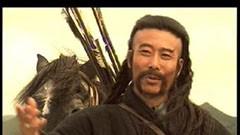Tetsubetsu was a famous general of the Mongol Empire, a well-known warlord under Genghis Khan, and one of the "Four Mastiffs". Tetsubetsu, formerly known as Theo-a-Hu Ah, a Mongol Bessube, was initially a subordinate of a leader of the Taichi Ubu Clan, who initially belonged to a faction opposing Temujin, and Tetsubetsu naturally began to stand against Genghis Khan.
In 1201, Genghis Khan and Zamuhe led eleven allied troops to attack Theichiwu and other departments, and in this battle, Genghis Khan won. The power of Taichiwu and other tribes gradually declined, so Tetsubetsu chose to defect to Genghis Khan. Tetsubetsu once wounded Temujin's white-billed yellow horse with an arrow during the battle, and Tetsuki asked who had shot him. Tetsubetsu admitted, but at the same time said, "If you spare me, give me a life, and go to the soup and go to the fire, you will not give up." ”
Genghis Khan admired this so much that he took in Tetsubetsu as a subordinate and gave him the name "Tetsubetsu". "Zhebetsu" means "arrow tribe" in Mongolian, which also shows that his sword skills are outstanding and have been admired by Genghis Khan.
In 1204 AD, Temujin entered the Naiman, with Tetsubetsu as the forward, tearing up the enemy like a ferocious Tibetan mastiff, and finally helping Temujin kill Sun Khan and his son, with a remarkable credit. Two years later, Temujin founded the Great Mongol State, and was elected by the various ministries as the Great Khan of the Mongol State, honored as "Genghis Khan", organized thousand households, and Tetsubetsu was appointed as the head of the thousand households.

Both the Jin Dynasty and mongolia were steppe peoples, opposed to the Mongol Empire. In order to continue to expand his power, Genghis Khan eventually ordered an attack on the Jin Dynasty. As a fierce general of Genghis Khan, Tetsubetsu naturally did not miss this battle. From the beginning of the Mongol Empire's war against Jin in 1211, Tetsubetsu made countless contributions, and even once rode into Jinzhongdu, raided Tokyo, and Tetsubetsu attacked Juyongguan. The destruction of Juyong Pass meant that the Mongol Empire could go on a large scale to cut gold, and Zhebei was indispensable.
In that year, Genghis Khan attacked naimanbu and captured and killed naimanbu sun khan, but sun khan's son Qu Chulu escaped by chance, and successfully occupied the western Liao territory a few years later. In order to solve the problem, Genghis Khan ordered an attack on the Liao state.
At that time, Qu Chulu was forcing followers of Islam to change their religion, and Tetsubetsu took advantage of this to express freedom of religious belief, which won the support of the local people. Therefore, when attacking the Law of Qu Chu, Tetsubetsu took advantage of the time and place, and soon forced the Law of Qu Chu to flee. Tetsubetsu chased all the way forward, and finally annihilated the Law of Qu Chu at Sari Huan.
In 1219, Genghis Khan announced his expedition to the west, which was an important journey in Genghis Khan's life. Tetsubetsu served as a forward in this western expedition, and then with the aid of Subutai, and then with the help of Dekucha'er, the soldiers did not spend time.
Genghis Khan originally wanted to quietly skip Mahama, so Tetsubetsu and the others quietly marched, but later Tekucha'er disobeyed Genghis Khan's orders and ordered the plundering of the local area, so that Mahamad escaped, and his son Zalandin confronted the lost Ji Kubu. Not to mention the behavior of The Grass and Snakes, it was even more important for Zalandin to seize the opportunity, and his strong army directly approached genghis Khan's headquarters. Zhebei and Subutai and others who were moving forward could only turn back to relieve the siege of Genghis Khan.
Genghis Khan was furious about this and directly ordered Tetsubetsu and the others to go after and kill the fleeing Hua Lazi, and made it clear that if he did not catch anyone, he would not come back.
Zhebei and the other generals then led their troops in pursuit, and Zhebei first crossed the Amu Darya River to Barihei. Because there was no trace of the place, I continued to move forward and chased you until you Schabuer. Tetsubetsu chases faster, Mahabharata runs faster. He was like a frightened rabbit, and as soon as the wind blew, he immediately threw up his legs and fled. So when Tetsubetsu found a trace of it, the man ran away again.
Tetsubetsu and Subutai pursued each other and held on tightly, much to Mahama's dismay. By the time Tetsubetsu passed through the cities of Muviyin, Gyalpo, Amori, and Asta, and met subutai at the city of Saburtai, Mahabharata was desperate. Thinking of how to die, after consulting with the minister accompanying him, he fled to a small island in the Kōda Jisi Sea to take refuge, and finally died of panic.
After this incident, the Mongol army went all the way to the west, unstoppable, and Tetsubetsu led his soldiers to attack one city after another, plundering huge wealth and fighting all the way to Russia.
In 1224, the Mongol army crossed the Dnieper River westward, swept south of Theros and entered the Crimean Peninsula. After hearing the order of the Mongol army to return to the east, he returned with his troops. Unfortunately, however, Tetsubetsu, who had made great achievements in battle, eventually died on the way home, due to fatigue and recurrence of injuries in his early years. After Tebetsu's death, Genghis Khan said that the Mongol Empire's divine arrow had fallen.